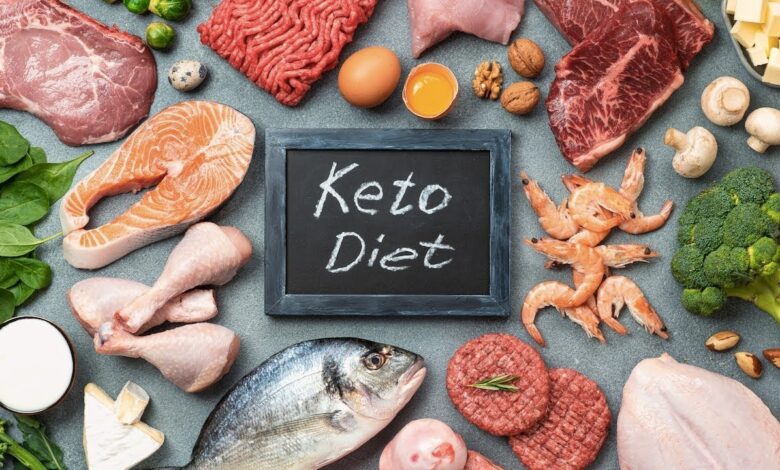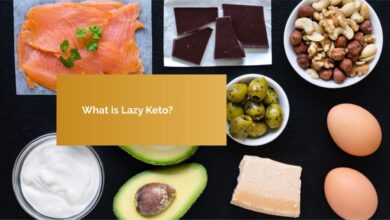
How to Incorporate Fruits in a Keto Diet
If you’re on a keto diet, you’ve probably heard the common misconception that fruits are off-limits. After all, fruits are packed with natural sugars, and with the keto diet focusing on low carbs, it seems like a no-go. But here’s the good news: not all fruits are created equal, and with a bit of knowledge, you can still enjoy fruits without throwing your keto progress off course.
In this guide, we’ll walk through everything you need to know about incorporating fruits into your keto meal plan, from choosing the right ones to balancing your macros. So, let’s dive into the world of keto-friendly fruits and explore how you can add them to your diet while staying on track.
Introduction

One of the biggest challenges on a keto diet is maintaining your carbohydrate intake under control. Since the primary goal of keto is to keep your body in a state of ketosis (where it burns fat instead of carbs for fuel), it’s essential to carefully track your carbs. However, that doesn’t mean you have to avoid all fruits altogether. In fact, certain fruits can be incredibly beneficial when incorporated correctly into your keto meals.
So, why are fruits often seen as a challenge on keto? Well, most fruits are naturally high in sugars, which means they can contribute to a higher carb count than what’s allowed on the keto diet. But don’t worry—there are still fruits that can fit into your keto lifestyle, allowing you to enjoy natural sweetness without exceeding your carb limit.
read also: Guide On How to Choose the Best Fruits for a Keto Diet
Keto Diet Basics
Before diving into fruit options, let’s take a quick look at the fundamentals of the keto diet.
What is the Keto Diet?
The keto diet is a high-fat, moderate-protein, and very low-carb diet that has been shown to help with weight loss and improve overall health. On keto, your body switches from using carbs as its primary energy source to burning fat instead. This process is known as ketosis.
Understanding Ketosis
When you drastically reduce carbs, your body depletes its glycogen stores (the form of carbohydrate stored in muscles and the liver) and starts burning fat for fuel instead. This produces ketones, which become the main source of energy for your brain and body.
The Role of Carbs in the Keto Diet
Carbs are limited to around 20–50 grams of net carbs per day on a keto diet. Net carbs are the total carbs minus fiber and sugar alcohols, as they don’t affect blood sugar levels in the same way as regular sugars. This limitation is why many fruits are tricky on keto, as most are rich in natural sugars, which are carbs.
Fruits and the Keto Diet
Why Fruits Are Challenging on Keto
Fruits contain varying amounts of sugar, and sugar is made up of carbs. So, if you’re not careful, the sugar in fruit can quickly add up and knock you out of ketosis. However, there are fruits that are relatively low in carbs and can be consumed in moderation, giving you a satisfying treat without compromising your keto goals.
High Sugar Content in Many Fruits
While fruits are packed with vitamins and nutrients, their sugar content can be high—think about grapes, bananas, or mangoes. These fruits, although healthy, contain too many carbs to be considered keto-friendly. That’s why knowing which fruits to choose is essential.
How to Balance Fruit Intake on Keto
The key to incorporating fruits into your keto diet is moderation. You can enjoy fruits that are lower in carbs and sugar, while keeping portion sizes in check. This allows you to enjoy the nutritional benefits without overdoing it on carbs.
Choosing the Right Fruits for Keto
Low-Carb vs. High-Carb Fruits
Low-carb fruits are your best bet when on a keto diet. These fruits are low in sugar and high in fiber, which helps you stay within your daily carb limit. On the other hand, high-carb fruits like bananas and grapes are best avoided or consumed in very limited quantities.
The Importance of Net Carbs
When tracking your carbs, it’s important to calculate net carbs, which are the total carbs minus fiber. Fiber doesn’t affect blood sugar the same way as other carbs, so it’s not counted in net carbs. This makes it possible to enjoy certain fruits without throwing off your keto goals.
The Role of Fiber in Keto-Friendly Fruits
Fiber-rich fruits are ideal for keto because they help slow down digestion and regulate blood sugar levels. These fruits are also more filling, helping to curb your appetite and prevent overeating. Plus, fiber is essential for gut health, which is crucial when following a high-fat diet like keto.
Top Keto-Friendly Fruits
Now, let’s dive into the best fruits that fit perfectly within your keto diet.
Berries (Strawberries, Raspberries, Blackberries)
Berries are among the lowest in sugar and carbs, making them an excellent choice for keto. A half-cup of raspberries contains only about 3 grams of net carbs, and strawberries and blackberries are similarly low. You can enjoy them in smoothies, salads, or as a snack.
Avocados
While technically a fruit, avocados are packed with healthy fats and very low in carbs. They are an excellent source of fiber, making them a perfect keto fruit. Plus, avocados help keep you full and provide a creamy texture for your meals. You can add them to salads, smoothies, or simply enjoy them as a snack with a sprinkle of salt.
Olives
Olives are another fruit that works well on keto due to their high fat content and low carb count. A small serving of olives provides healthy fats and can be a great addition to your meals or snacks.
Tomatoes
Although often considered a vegetable, tomatoes are actually fruits. They are low in carbs and can be enjoyed on keto, but it’s important to keep portions in check. Tomatoes add great flavor to keto salads, sauces, and even as a snack with some cheese.
Lemons and Limes
These citrus fruits are packed with vitamin C and have a very low carb content, making them an ideal keto fruit. Use them to add flavor to your water, dressings, or dishes without worrying about spiking your carb count.
Moderately Keto-Friendly Fruits
Some fruits can be consumed in moderation on keto, depending on your daily carb limit. These include:
Cantaloupe
Cantaloupe is a bit higher in sugar than berries but still relatively low in carbs compared to other fruits. A small portion of cantaloupe can provide vitamins and hydration without exceeding your carb limit.
Kiwi
Kiwi is another fruit that’s a good source of vitamin C and fiber. A small kiwi contains about 6–7 grams of net carbs, so it’s best to enjoy it in small portions to stay within your carb limit.
Watermelon
Watermelon is mostly water, making it a hydrating option on keto. A small serving can be enjoyed, but since it has a higher glycemic index, it’s best consumed in moderation.
Grapefruit
Grapefruit can be consumed in small portions on keto. It’s low in carbs and high in vitamin C, making it a good choice for those looking to enjoy citrus flavors while staying in ketosis.
Fruits to Avoid on a Keto Diet
Certain fruits should be avoided entirely or consumed in very limited amounts due to their high carb content.
High-Sugar Fruits to Limit
These include bananas, grapes, mangoes, and pineapples. They are packed with sugars and can push you over your daily carb limit quickly, so it’s best to steer clear of them or reserve them for rare occasions.
Dried Fruits
Dried fruits like raisins, dates, and apricots are concentrated in sugars and carbs. Even a small portion can have a significant impact on your carb count, making them unsuitable for a keto diet.
Fruit Juices and Concentrates
Fruit juices, even 100% pure juice, often contain high amounts of sugar. They are best avoided on keto, as they provide little nutritional value and are easy to consume in large quantities, which can quickly push you out of ketosis.
Creative Ways to Include Fruits in Your Keto Diet
Now that you know which fruits to eat, let’s look at some creative ways to enjoy them while maintaining ketosis.
Keto Fruit Smoothies
Smoothies are a great way to combine your favorite keto-friendly fruits into one delicious drink. Use a base of unsweetened almond milk or coconut milk, and add berries, avocado, or spinach for an added nutritional boost.
Fruit-Based Sauces and Dips
You can use fruits like tomatoes, avocados, and lemons to make low-carb sauces and dips. These can be served with keto-friendly snacks or meals to enhance flavor and provide additional nutrients.
Incorporating Fruits in Salads and Side Dishes
Add berries or avocado slices to your salad for a burst of flavor and healthy fats. You can also make a refreshing fruit salsa with cucumbers and tomatoes to accompany your main dish.
Portion Control and Carb Budgeting for Keto Fruits
Measuring Serving Sizes
When eating fruit on keto, portion control is key. Be sure to measure your servings, especially with fruits that are higher in carbs. Use a food scale or measuring cup to stay accurate.
How to Track Net Carbs
Use a net carb calculator or tracking app to keep track of your fruit intake. Remember that net carbs are total carbs minus fiber, and this is what impacts your ketosis state.
Mindful Eating and Portion Control
It’s easy to get carried away with fruits, but remember to stay mindful of your daily carb limit. Stick to small servings of fruits and balance them with other keto-friendly foods like healthy fats and proteins.
The Benefits of Adding Fruit to Your Keto Meal Plan
Providing Essential Nutrients
Fruits are rich in vitamins, minerals, and antioxidants that support overall health. Incorporating keto-friendly fruits ensures you’re not missing out on essential nutrients like vitamin C, potassium, and fiber.
Enhancing Flavor Without Overloading on Carbs
Fruits can provide a natural sweetness and refreshing flavor that makes keto meals more enjoyable. By choosing the right fruits, you can enjoy these flavors without sabotaging your keto progress.
The Importance of Variety in Your Diet
A varied diet is key to maintaining nutritional balance on keto. Including a few fruits in your meal plan adds diversity, making your meals more interesting and enjoyable.
Common Myths About Fruits and Keto
“Fruit Is Too High in Carbs for Keto”
While many fruits are high in carbs, there are plenty of keto-friendly options with minimal impact on blood sugar. The key is to choose the right fruits and eat them in moderation.
“You Can’t Have Any Sugar on Keto”
Keto doesn’t mean zero sugar; it means low sugar. Natural sugars from low-carb fruits like berries are acceptable in small portions, as long as they fit within your carb limit.
“Fruit Juices Are Safe for Keto”
Fruit juices are often packed with sugar and lack fiber, making them unsuitable for keto. Stick to whole fruits for the most benefits, and avoid juices whenever possible.
Expert Tips for Successful Fruit Consumption on Keto
Consulting a Nutritionist
If you’re new to keto, a nutritionist can help you navigate the complexities of fruit selection and portion control. They can guide you in choosing the best fruits for your personal carb tolerance.
Staying Hydrated and Electrolyte Balance
Keto can lead to dehydration and electrolyte imbalances, so be sure to drink enough water and consider supplementing with electrolytes.
Balancing Fruits with Other Nutrients on Keto
Focus on a balanced diet by combining fruits with healthy fats and proteins. This helps you stay satisfied and provides the energy you need to maintain ketosis.
Conclusion
Incorporating fruit into a keto diet is possible with the right selection and portion control. By choosing low-carb, high-fiber fruits like berries, avocados, and tomatoes, you can still enjoy the nutritional benefits of fruit without exceeding your carb limit. With careful planning and mindful eating, fruits can become a valuable part of your keto journey.
FAQshttps://en.wikipedia.org/wiki/FAQ
- How much fruit can I eat on a keto diet? Aim for about 20–50 grams of net carbs daily. This typically allows for 1–2 servings of low-carb fruits, but always monitor your carb intake.
- Can I have fruit on keto and still stay in ketosis? Yes, as long as you choose fruits with low net carbs and eat them in moderation, you can stay in ketosis.
- What is the best fruit to eat on keto for weight loss? Berries, such as strawberries, raspberries, and blackberries, are excellent for keto weight loss due to their low carb content and high fiber.
- Can I eat fruit on keto for breakfast? Yes, small servings of low-carb fruits can be included in a keto-friendly breakfast, especially when paired with proteins and fats.
- How do I avoid overconsuming carbs from fruit on keto? Be mindful of your portions, track your net carbs, and stick to fruits that are low in sugar and high in fiber to stay within your carb limit.




